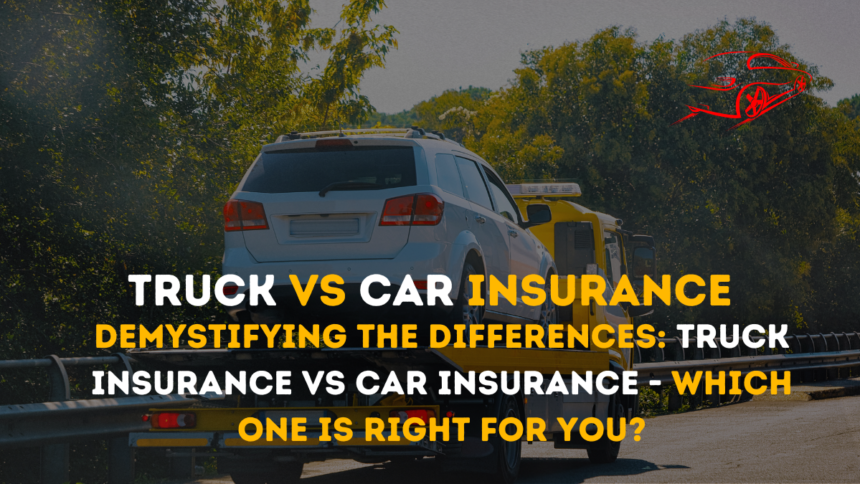Introduction
Are you confused about the differences between truck insurance and car insurance? Don’t worry, you’re not alone. Many people find it challenging to understand the nuances of each type of coverage and determine which one is right for their needs. In this article, we will demystify the differences between truck insurance and car insurance to help you make an informed decision.
Truck insurance and car insurance may seem similar on the surface, but there are some key distinctions that you need to be aware of. From coverage options to cost factors, each type of insurance has its unique considerations. Understanding these differences will allow you to choose the appropriate insurance policy that meets your requirements and provides adequate protection.
Whether you own a truck or a car, it’s crucial to have the right insurance coverage in place to protect your vehicle and yourself in case of an accident or other unforeseen events. By comparing the specific features of truck insurance and car insurance, we will guide you through the decision-making process and help you choose the insurance that fits your needs like a glove. So let’s dive in and unravel the complexities of truck insurance vs car insurance.
Understanding the differences between truck insurance and car insurance
When it comes to vehicle insurance, many people assume that truck insurance and car insurance are essentially the same. However, this is not the case. There are significant differences between these two types of insurance that you need to be aware of.
The primary distinction lies in the nature of the vehicles themselves. Trucks are typically larger, heavier, and designed for different purposes than passenger cars. As a result, the risks associated with operating a truck are often more complex and potentially more severe than those associated with driving a car. Truck drivers may face unique challenges, such as navigating tight spaces, hauling heavy loads, and dealing with increased stopping distances.
These differences translate into distinct coverage requirements and pricing structures for truck insurance and car insurance. Truck insurance policies tend to be more comprehensive, covering a wider range of risks and offering higher liability limits to account for the potential for more significant damage and injuries in the event of an accident. Car insurance, on the other hand, may have more streamlined coverage options that are tailored to the needs of individual drivers and their passenger vehicles.
By understanding the key differences between truck insurance and car insurance, you can make an informed decision about the coverage that best suits your specific needs and ensures that you are adequately protected on the road.
Coverage options for truck insurance
Truck insurance policies typically include a broader range of coverage options compared to car insurance. This is because trucks, by nature, present a higher level of risk due to their size, weight, and the types of tasks they are used for.
One of the primary coverage options in truck insurance is liability coverage. This type of coverage protects the truck owner in the event that they are found legally liable for damages or injuries caused to another party in an accident. Truck liability limits are often higher than those found in car insurance policies, reflecting the potential for more significant losses.
Another important coverage option for truck insurance is physical damage coverage, which can include collision and comprehensive protection. This coverage helps to protect the truck itself in the event of an accident, theft, or other types of damage. Truck owners may also opt for additional coverages, such as cargo insurance, which protects the goods being transported, or bobtail insurance, which provides coverage when the truck is being operated without a trailer.
Truck insurance policies may also include coverage for specialized equipment, such as cranes, lifts, or other specialized attachments that are commonly found on commercial trucks. This type of coverage ensures that the truck owner is protected in the event of damage to these critical components.
Overall, the breadth of coverage options available in truck insurance reflects the unique risks and responsibilities associated with operating a commercial vehicle. By carefully selecting the appropriate coverage, truck owners can ensure that they are adequately protected and prepared to handle any unexpected events that may arise on the road.
Coverage options for car insurance
While truck insurance policies tend to be more comprehensive, car insurance coverage options are generally more streamlined and tailored to the needs of individual drivers and their passenger vehicles.
The foundation of most car insurance policies is liability coverage, which protects the policyholder in the event that they are found legally responsible for damages or injuries caused to another party in an accident. Car liability limits are typically lower than those found in truck insurance, as the potential for more significant losses is generally lower with passenger vehicles.
In addition to liability coverage, car insurance policies often include collision and comprehensive protection. Collision coverage helps to repair or replace the policyholder’s vehicle in the event of an accident, while comprehensive coverage protects against other types of damage, such as theft, vandalism, or natural disasters.
Car insurance policies may also include additional coverage options, such as personal injury protection (PIP) or uninsured/underinsured motorist coverage. PIP provides medical coverage for the policyholder and their passengers, regardless of who is at fault in an accident, while uninsured/underinsured motorist coverage protects the policyholder in the event that they are involved in an accident with a driver who has insufficient or no insurance coverage.
While the coverage options for car insurance may not be as extensive as those found in truck insurance, they are still designed to provide comprehensive protection for the unique needs of passenger vehicle owners. By carefully evaluating their individual requirements, car owners can select the coverage that best suits their driving habits and financial considerations.
Factors to consider when choosing between truck insurance and car insurance
When deciding between truck insurance and car insurance, there are several key factors to consider to ensure that you select the coverage that best meets your needs.
The first and most obvious factor is the type of vehicle you own. If you operate a commercial truck, such as a semi-truck, dump truck, or delivery van, then truck insurance will be the more appropriate choice. Truck insurance is specifically designed to address the unique risks and liabilities associated with operating a commercial vehicle.
Another important factor to consider is the intended use of the vehicle. Truck insurance policies are typically more comprehensive and may include coverage options that are not available in standard car insurance policies, such as cargo insurance or bobtail insurance. If you plan to use your vehicle for commercial purposes, such as transporting goods or materials, then truck insurance may be the better option.
The size and weight of the vehicle are also significant factors to consider. Larger, heavier trucks pose a greater risk of causing more severe damage and injuries in the event of an accident. As a result, truck insurance policies often have higher liability limits to account for this increased risk. If you own a larger, heavier vehicle, truck insurance may be the more appropriate choice.
Finally, the cost of the insurance coverage is an important consideration. Truck insurance policies tend to be more expensive than car insurance policies, due to the increased risks and coverage options. However, the cost of the insurance should be weighed against the potential financial consequences of an accident or other incident. Choosing the appropriate coverage can help to protect you from significant financial losses in the long run.
Cost comparison between truck insurance and car insurance
When it comes to the cost of insurance, there is a noticeable difference between truck insurance and car insurance. In general, truck insurance tends to be more expensive than car insurance, but there are several factors that contribute to this disparity.
One of the primary drivers of higher truck insurance costs is the increased risk associated with operating a commercial vehicle. Trucks are larger, heavier, and often used for more demanding tasks, such as hauling heavy loads or navigating tight spaces. This increased risk translates into higher liability limits and more comprehensive coverage options, which ultimately results in higher premiums.
Additionally, the cost of repairing or replacing a damaged truck is often significantly higher than the cost of repairing or replacing a passenger vehicle. Trucks are more complex machines with specialized components, and the labor and parts required to maintain them can be more expensive. This higher cost of repairs and replacements is also reflected in the premiums for truck insurance.
Another factor that can contribute to the cost of truck insurance is the driver’s experience and driving record. Truck drivers are often held to higher standards than passenger vehicle drivers, and insurers may take into account factors such as the driver’s training, their history of accidents or violations, and the type of cargo they typically transport. Drivers with a clean record and extensive experience may be able to secure more favorable rates, while those with a history of incidents may face higher premiums.
While the cost of truck insurance is generally higher than car insurance, it is important to remember that the coverage provided is also more comprehensive and tailored to the unique needs of commercial vehicles. By carefully evaluating the coverage options and weighing the potential risks, truck owners can make an informed decision about the appropriate insurance coverage for their needs.
Common misconceptions about truck insurance and car insurance
One common misconception about truck insurance and car insurance is that they are essentially the same, with only minor differences in coverage and pricing. As we’ve discussed, this is not the case. The two types of insurance have distinct features and considerations that set them apart.
Another misconception is that truck insurance is only necessary for large commercial vehicles, such as semi-trucks or tractor-trailers. In reality, truck insurance can be applicable to a wide range of commercial vehicles, including pickup trucks, vans, and even some SUVs that are used for business purposes. The specific coverage requirements will depend on the size, weight, and intended use of the vehicle.
Some people also believe that truck insurance is more expensive than car insurance because it is primarily for commercial vehicles. While it is true that truck insurance tends to be more costly, the reason is not solely because of the commercial nature of the vehicle. The increased risk and higher liability limits associated with operating a commercial vehicle are the primary drivers of the higher premiums.
Another common misconception is that truck insurance is only necessary for long-haul truckers or those who transport heavy loads. In reality, any business or individual who uses a commercial vehicle, even for local deliveries or short trips, should consider truck insurance to protect themselves and their assets. The risks associated with operating a commercial vehicle are present regardless of the distance or type of cargo being transported.
By dispelling these common misconceptions and understanding the true differences between truck insurance and car insurance, you can make a more informed decision about the coverage that best suits your needs and ensures that you are adequately protected on the road.
How to find the right insurance provider for your needs
When it comes to finding the right insurance provider for your truck or car, there are several factors to consider to ensure that you get the coverage you need at a fair price.
One of the first steps is to research and compare different insurance providers. Look for companies that specialize in the type of vehicle you own, whether it’s a truck or a passenger car. These providers will have a deeper understanding of the specific coverage requirements and risks associated with your vehicle, and they may be able to offer more tailored policies.
It’s also important to consider the financial stability and reputation of the insurance provider. Look for companies with a strong track record of paying claims and providing excellent customer service. You can research reviews, ratings, and financial information to help you make an informed decision.
Another important factor to consider is the level of coverage and the limits of liability. Make sure that the insurance provider offers the necessary coverage options to protect you and your vehicle, whether it’s liability, collision, comprehensive, or specialized coverages like cargo insurance or bobtail insurance for truck owners.
Finally, don’t forget to compare quotes from multiple insurance providers. Prices can vary significantly, and you may be able to find a better deal by shopping around. However, it’s important to balance cost with the level of coverage and the reputation of the insurance provider to ensure that you are getting the best value for your money.
Tips for saving money on truck insurance and car insurance
Regardless of whether you own a truck or a car, finding ways to save money on your insurance can be a priority. Here are some tips to help you save on your truck insurance or car insurance premiums:
- Maintain a clean driving record: Your driving history is one of the most significant factors that insurers consider when determining your premiums. Avoiding accidents and traffic violations can help you secure lower rates.
- Consider higher deductibles: Choosing a higher deductible can lower your monthly or annual premiums, but it’s important to ensure that you have the financial means to cover the deductible if you need to file a claim.
- Take advantage of discounts: Many insurance providers offer a variety of discounts, such as for safe driving, vehicle safety features, or bundling your insurance policies. Be sure to ask about any available discounts that you may qualify for.
- Review your coverage regularly: As your needs and circumstances change over time, it’s important to review your insurance coverage to ensure that you’re not paying for more than you need. Consider adjusting your coverage levels or deductibles to find the right balance between protection and cost.
- Shop around: Don’t be afraid to compare quotes from multiple insurance providers. Prices can vary significantly, and you may be able to find a better deal by shopping around.
- Improve your credit score: In many states, insurance providers use credit scores as a factor in determining premiums. Improving your credit score can help you secure lower rates.
- Consider usage-based insurance: Some insurance providers offer usage-based insurance programs that track your driving habits and adjust your premiums accordingly. If you’re a safe and infrequent driver, this type of program could help you save money.
By implementing these tips, you can help ensure that you’re getting the best value for your money when it comes to your truck insurance or car insurance.
Conclusion: Making an informed decision for your insurance needs
In the end, the decision between truck insurance and car insurance comes down to the specific needs and requirements of your vehicle and driving situation. By understanding the key differences between these two types of insurance, you can make an informed decision that provides the right level of protection and coverage for your needs.
Whether you own a truck or a car, it’s important to carefully evaluate your options and select the insurance policy that best fits your needs. This may involve considering factors such as the size and weight of your vehicle, the intended use, your driving history, and your budget.
By taking the time to research and compare your options, you can ensure that you are adequately protected on the road and that you are not overpaying for coverage that you don’t need. Remember, the right insurance policy can provide valuable peace of mind and financial protection in the event of an accident or other unexpected incident.
So, take the time to explore the differences between truck insurance and car insurance, and make an informed decision that will give you the coverage you need and the value you deserve. With the right insurance policy in place, you can focus on enjoying the open road and the adventures that come with it, knowing that you are prepared for whatever may come your way.







